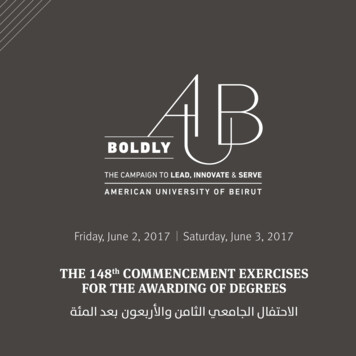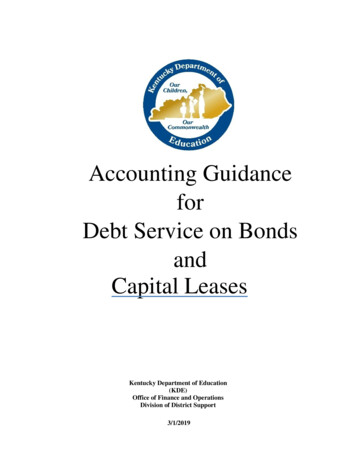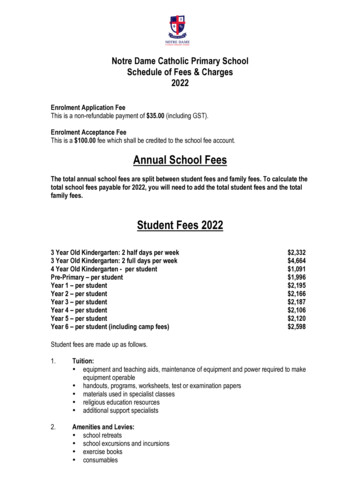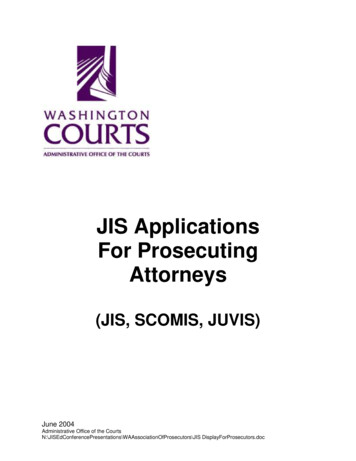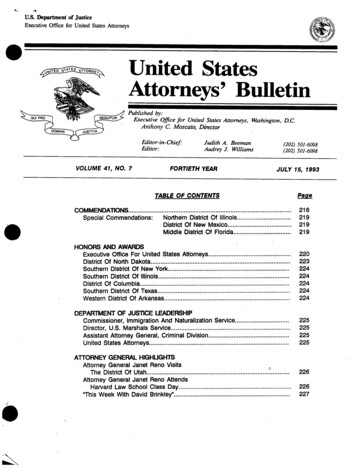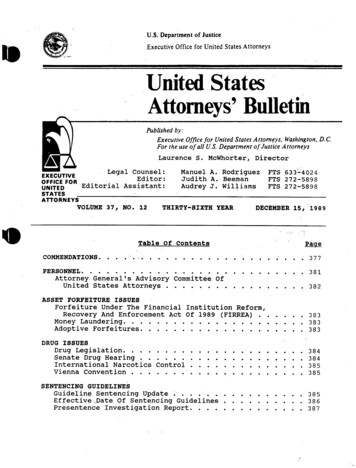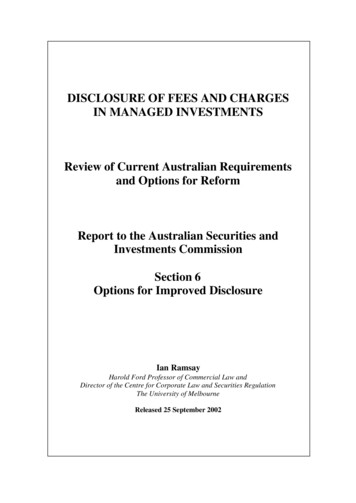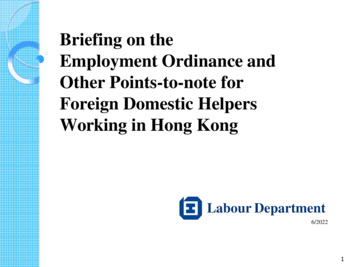
Transcription
AWARDING ATTORNEYS’ FEESIN NORTH CAROLINAJim Gale2018 Superior Court Judges’ Summer ConferenceJUNE 21, 2018I note my appreciation to my law clerk Kaitlin Price and law students Jon Warren andCatherine Bryant for their efforts in preparing this article.
Awarding Attorneys’ Fees in North CarolinaI.IntroductionThis paper addresses certain issues related to the award of attorneys’ fees in casesregularly appearing in Superior Court, including the findings of fact necessary to supportan award of fees. This paper does not address the award of attorneys’ fees in family lawmatters.II.List of Statutes that Authorize the Award of Attorneys’ Feesa. Generally, recovery of attorneys’ fees is based on a statute.b. The following North Carolina statutes authorize the award of attorneys’ fees:1) Unfair or Deceptive Trade Practices Act, N.C. Gen. Stat. § 75-16;2) Wage and Hour Act, N.C. Gen. Stat. § 95-25.22;3) Derivative shareholder actions, N.C. Gen. Stat. § 55-7-46;4) Derivative actions against an LLC, N.C. Gen. Stat. § 57D-8-05;5) Partnership derivative actions, N.C. Gen. Stat. § 59-1004(a);6) Breach of LLC operating agreements that include fee provisions, N.C. Gen. Stat.§ 57D-2-32;7) Debt collection actions when fees are provided for in the contract, N.C. Gen. Stat.§ 6-21.2;8) Nonjusticiable cases, N.C. Gen Stat. § 6-21.5;9) Frivolous and malicious claims for, or defenses against, punitive damages, N.C.Gen. Stat. § 1D-45;10) Violations of Rule 11, Rule 26(g), or Rule 37(b)(2) of the N.C. Rules of CivilProcedure;11) Trade Secrets Protection Act, N.C. Gen. Stat. § 66-154(d);12) Reciprocal attorneys’ fees provisions in business contracts, N.C. Gen. Stat. § 621.6;13) Lien enforcement and payment bond enforcement actions, N.C. Gen. Stat. § 44A35;14) Actions involving certain securities fraud, N.C. Gen. Stat. § 78A-56;15) Certain matters regarding a business entity’s indemnification of directors,officers, employees, and agents, N.C. Gen. Stat. § 55-8-52;16) Certain personal injury and property damage claims, N.C. Gen. Stat. § 6-21.1;17) Certain domestic or family issues, N.C. Gen. Stat. § 50-16.4, N.C. Gen. Stat.§ 50-13.6, N.C. Gen. Stat. § 6-21;18) Certain cases involving principals or teachers, N.C. Gen. Stat. § 6-21.4;19) Cases involving cities or counties that acted outside the scope of their authority,N.C. Gen. Stat. § 6-21.7;20) Certain prevailing parties on appeal from an appropriate agency’s decision, N.C.Gen. Stat. § 6-19.1;1
21) Certain actions to enforce provisions of the articles of incorporation, thedeclaration, bylaws, or duly adopted rules and regulations brought under the N.C.Planned Community Act, N.C. Gen. Stat. § 47F-3-120; see also N.C. Gen. Stat.§ 47F-3-116;22) A living probate proceeding, N.C. Gen. Stat. § 28A-2B-6;23) Judicial proceedings involving the administration of a trust, N.C. Gen. Stat.§ 36C-10-1004;24) A consumer credit sale, N.C. Gen. Stat. § 25A-21; and25) Certain actions brought by individuals for violation of Article 33C, which requiresofficial meetings of a public body to be held in public, N.C. Gen. Stat. §143318.16B.c. Additionally, N.C. Gen. Stat. § 6-21 defines “costs” to include attorneys’ fees in twelvematters in which the costs “shall be taxed against either party, or apportioned among theparties, in the discretion of the Court.” N.C. Gen. Stat. § 6-21 (2015).III.Rules of General Applicationa. The long-standing general rule in North Carolina has been that a party may not recoverattorneys’ fees, either as damages or costs, unless authorized by statute. See StillwellEnter., Inc. v. Interstate Equip. Co., 300 N.C. 286, 289, 266 S.E.2d 812, 814 (1980); seealso Graham Cty. Bd. of Elections v. Graham Cty. Bd. of Comm’rs., 212 N.C. App. 313,325, 712 S.E.2d 372, 380 (2011); Robinson v. Robinson, 210 N.C. App. 319, 336, 707S.E.2d 785, 797 (2011).b. Therefore, with the exception of negotiated class-action settlements, discussed below inSection VII, to award attorneys’ fees, the trial court undergoes a two-step process todetermine: (1) whether there is a statutory basis for a fee award; and (2) if so, whether thefee award requested is reasonable. See Furmick v. Miner, 154 N.C. App. 460, 462, 573S.E.2d 172, 174 (2002).c. When awarding attorneys’ fees, the trial court should specify the statutory basis for theaward and make the specific findings required by that statute.d. On appeal, the trial court’s determination that awarding attorneys’ fees was permissiblepursuant to a specified statute is a question of law reviewed de novo. S. Seeding Serv.,Inc. v. W.C. English, Inc., 224 N.C. App. 90, 99, 735 S.E.2d 829, 835 (2012); see alsoPenninga v. Travis, No. COA16-751, 2017 N.C. App. LEXIS 117, at *9 (N.C. App.2017).2
e. The Court of Appeals reviews the amount of the fee award under an abuse of discretionstandard. See Faucette v. 6303 Carmel Rd., LLC, 242 N.C. App. 267, 278, 775 S.E.2d316, 325 (2015); Phillips v. Orange Cty. Health Dep’t, 237 N.C. App. 249, 261, 765S.E.2d 811, 820 (2014); Williams v. New Hope Found., Inc., 192 N.C. App. 528, 530,665 S.E.2d 586, 587 (2008); Furmick, 154 N.C. App. at 462, 573 S.E.2d at 174.i. But a failure to make necessary findings may constitute an abuse of discretion.See McKinnon v. CV Indus., 228 N.C. App. 190, 200, 745 S.E.2d 343, 350(2013) (vacating an award of attorneys’ fees pursuant to section 75-16.1 wherethe trial court made findings that “may be sufficient to support an ultimatefinding that plaintiff knew or should have known that his Chapter 75 claimagainst defendant was frivolous and malicious,” but “the trial court’s orderlack[ed] such an ultimate finding”); see also WFC Lynnwood I, LLC v. Lee ofRaleigh, Inc., COA17-562, N.C. App. , 2018 N.C. App. LEXIS 564, at*17–19 (N.C. App. June 5, 2018) (vacating the trial court’s fee award andremanding for more specific findings where the trial court found that theattorneys’ rates “were comparable and reasonable for the work done, thesubject matter of the case, and experience of the attorneys” but there was noevidence in the affidavit or offered at the hearing “with respect to comparablerates in this field of practice”).f. On appeal, an award of attorneys’ fees is first reviewed to determine “whether anycompetent evidence supports the trial court’s findings of fact and whether these findingssupport the court’s conclusions of law.” Faucette, 242 N.C. App. at 278, 775 S.E.2d at325 (2015).IV.Findings Needed to Establish the Reasonableness of the Feesa. In addition to the specific additional findings a particular statute may require, the trialcourt must make findings to determine the reasonableness of an attorney fee award. Inassessing reasonableness, the court should consider: the time and labor expended; the skill required; the customary fee for like work; the experience or ability of the attorney; the novelty and difficulty of the questions of law; the adequacy of the representation; the difficulty of the problems faced by the attorney, especially anyunusual difficulties; the type of case; and the result obtained.United Labs., Inc. v. Kuykendall, 335 N.C. 183, 195, 437 S.E.2d 374, 381–82 (1993); seealso N.C. R. Prof. Conduct 1.5.3
b. The trial court “may also in its discretion consider and make findings on ‘the servicesexpended by paralegals and secretaries acting as paralegals if, in [the trial court’sopinion], it is reasonable to do so.’” United Labs., Inc, 335 N.C. at 195, 437 S.E.2d at382 (alteration in original) (quoting Lea Co. v. N.C. Bd. of Transp., 323 N.C. 691, 695,374 S.E.2d 868, 871 (1989)).c. The trial court must make specific findings and cannot merely state that the attorney’sservices have a “reasonable value in excess of” a specified dollar amount. See Falls v.Falls, 52 N.C. App. 203, 221, 278 S.E.2d 546, 558 (1981).d. When assessing the reasonableness of an attorneys’ fee award in a contingency case, thecourt should consider the additional factors listed in Rule 1.5 of the Revised Rules ofProfessional Conduct, including: “the likelihood, if apparent to the client, that the acceptance of the particularemployment will preclude other employment by the lawyer,” N.C. R. Prof.Conduct 1.5(a)(2); “the time limitations imposed by the client or by the circumstances,” N.C. R. Prof.Conduct 1.5(a)(5); “the nature and length of the professional relationship with the client,” N.C. R.Prof. Conduct 1.5(a)(6); “the experience, reputation, and ability of the lawyer or lawyers performing theservices,” N.C. R. Prof. Conduct 1.5(a)(7).See Ehrenhaus v. Baker, 216 N.C. App. 59, 96–97, 717 S.E.2d 9, 33–34 (2011).i. Note Well: Particular issues arise when there is no written fee agreement or theprovisions of the written agreement do not comply with Rule 1.5.e. The lodestar method is commonly used to determine a reasonable attorneys’ fee award.When using the lodestar method, courts multiply “the number of hours reasonablyexpended on the litigation . . . by a reasonable hourly rate.” Out of the Box Developers,LLC v. Doan Law LLP, 2014 NCBC LEXIS 39 at *24 (N.C. Super. Ct. Aug. 29, 2014)(quoting Hensley v. Eckerhart, 461 U.S. 424, 433 (1983)). The Court should exclude anyhours that were not reasonably expended on the litigation, including “hours that areexcessive, redundant, or otherwise unnecessary.” Id. (quoting Hensley, 461 U.S. at 434).f. While the trial court may award fees towards the upper range of the lodestar amount, inNorth Carolina, a trial court cannot award a “merit bonus” or bonus fees, which areadditional amounts awarded based on the nature and complexity of the case or therepresentation provided. Coastal Prod. Credit Assoc., 70 N.C. App. at 229, 319 S.E.2d at656. In Coastal Production Credit Association v. Goodson Farms, Inc., the Court ofAppeals determined that the trial court’s award of a “merit bonus” due to the “nature,complexity, responsibility[,] and timeliness with which plaintiff’s attorney representedhis client” was improper because the trial court exceeded its discretion in making such an4
award. Id. The Court of Appeals noted the trial court considered reasonableness factorsin connection to the calculation of an hourly rate, and that the court could have set ahigher rate based on the complexity of the case, but that a merit bonus was not proper.Id.V.Awarding Attorneys’ Fees Pursuant to Specific Statutes and the Additional FactFindings the Statutes Requirea. The North Carolina Unfair or Deceptive Trade Practices Act.i.The trial court, in its discretion, may award attorneys’ fees to the party whoprevailed on an unfair or deceptive trade practices claim “upon a finding . . . [that][t]he party charged with the violation has willfully engaged in the act or practice,and there was an unwarranted refusal by such party to fully resolve the matterwhich constitutes the basis of such suit.” N.C. Gen. Stat. § 75-16.1(1) (2015)(emphasis added). Willfulness An act is willful “if it is ‘done voluntarily and intentionally with theview to doing injury to another.’” Faucette, 242 N.C. App. at 279,775 S.E.2d at 326 (quoting Standing v. Midgett, 850 F. Supp. 396, 404(E.D.N.C. 1993)) (finding a defendant’s conduct willful where hetestified that he intentionally withheld funds despite knowing suchfunds belonged to the plaintiff); compare Clark Material Handling Co.v. Toyota Material Handling U.S.A., Inc., No. 3:12-CV-00510-MOCDSC, 2015 U.S. Dist. LEXIS 72510, at *16 (W.D.N.C. June 3, 2015)(finding that defendant’s conduct was willful because it knew ofplaintiff’s contract with a third party and coerced plaintiff into endingthe contract by threatening to terminate plaintiff’s dealership) withStanding, 850 F. Supp. at 404 (finding a non-lawyer defendant’sfailure to disclose a lien was not willful, because the defendanttestified he did not know the meaning of the warranty language and“believed the lien was not valid and enforceable”). Unwarranted Refusal to Settle An unwarranted refusal must amount to something more than therejection of a settlement offer. See Irwin Indus. Tool Co. v.Worthington Cylinders Wisconsin, LLC, 747 F. Supp. 2d 568, 590(W.D.N.C. 2010) (finding the defendant’s refusal to settle unwarrantedwhen its “best settlement offer did not approach even half of [thelitigation’s] undisputed amounts” regarding damages).5
ii. This finding requires a determination on a case by case basis. But thetrial court must make specific findings explaining why it found thatthere was an unwarranted refusal to settle. See, e.g., Faucette, 242N.C. App. at 278–79, 775 S.E.2d at 325–26 (affirming the trial court’sfinding of an unwarranted refusal to settle where the court found thatall efforts to resolve the claim imposed conditions on the plaintiff andthat the defendant did not make an unconditioned offer to settle untilyears after the litigation began); Lapierre v. Samco Dev. Corp., 103N.C. App. 551, 561, 406 S.E.2d 646, 651 (1991) (affirming the trialcourt’s award of fees based on its finding that there was anunwarranted refusal to settle by the defendant where the trial courtfound that the offers defendant made were unreasonable andinadequate, “considering the judgment entered for the plaintiffs”). In Clark Material Handling Co. v. Toyota Material Handling USA, thecourt found defendant’s refusal to settle unwarranted, and explainedthat while the parties “discuss[ed] the possibility of settlement oncetrial began, by the time [d]efendant offered any money to settle, theparties had expended significant time and resources preparing fortrial.” 2015 U.S. Dist. LEXIS 72510, at *18. The court also noteddefendant’s best offer came after the jury verdict and was less than thejury award. Id.The trial court may also, in its discretion, award attorneys’ fees against theclaimant when the party defending against a 75-1.1 claim prevails and the courtfinds that “[t]he party instituting the action knew, or should have known theaction was frivolous and malicious.” N.C. Gen. Stat. § 75-16.1(2) (emphasisadded); see also Birmingham v. H&H Home Consultants & Designs, Inc., 189N.C. App. 435, 443, 658 S.E.2d 513, 519 (2008) (explaining that section 7516.1(2) applies to a motion for attorneys’ fees brought by the prevailingdefendant); Fed. Point Yacht Club Ass’n v. Moore, COA15-92, 2015 N.C. App.LEXIS 1028, *19–20 (N.C. App. Dec. 15, 2015) (“A prevailing defendant doesnot need to be wholly successful against a UDTP claim at trial, as we have held adefendant is a prevailing party after success on partial summary judgment.”). Frivolous and Malicious. “A claim is frivolous if a proponent can present no rational argumentbased upon the evidence or law in support of [it].” Fed. Point YachtClub Ass’n, 2015 N.C. App. LEXIS 1028, at *22 (quoting Blyth v.McCrary, 184 N.C. App. 654, 663 n. 5, 646 S.E.2d 813, 819 n. 5(2007)).6
A “claim is malicious if it is wrongful and done intentionally withoutjust cause or excuse or as a result of ill will.” Id.iii.The decision to award attorneys’ fees and determine the amount is “within thesole discretion of the trial judge.” Faucette, 242 N.C. App. at 278, 775 S.E.2d at325. Accordingly, even if “the trial court finds that the elements of N.C. Gen.Stat. § 75-16.1 have been met, the trial court retains the discretion to refuse toaward attorney’s fees.” Sheng Yu Ke v. Heng-Qian Zhou, N.C. App. , 808S.E.2d 458, 462–63 (2017) (citing Willen v. Hewson, 174 N.C. App. 714, 722,622 S.E.2d 187, 192 (2005)).iv.When a trial court, in its discretion, denies a motion for attorneys’ fees, the courtdoes not need to make the statutory findings required pursuant to section 75-16.1.See E. Brooks Wilkins Fam. Med., P.A. v. WakeMed, 244 N.C. App. 567, 581, 784S.E.2d 178, 187 (2016).v.While the Court has the discretion to award attorneys’ fees to the prevailing party,it is not required to do so, see N.C. Gen. Stat. § 75-16.1; but the Court is requiredto treble the damages awarded by the jury, see N.C. Gen. Stat. § 75-16. Moreover, treble damages do not automatically allow the trial court to find theprevailing party is entitled to attorneys’ fees. While “[a] person damaged byanother’s unfair or deceptive acts or practices is entitled to treble damages,”Shepard v. Bonita Vista Props., L.P., 191 N.C. App. 614, 624, 664 S.E.2d388, 395 (2008), aff'd, 363 N.C. 252, 675 S.E.2d 332 (2009) (citing N.C. Gen.Stat. § 75-16), an award of attorneys’ fees must be supported by findings thata party “willfully engaged” in a violation of the statute, “and there was anunwarranted refusal by such party to fully resolve the matter.” N.C. Gen. Stat.§ 75-16.1(1).b. The North Carolina Wage and Hour Act.i.The court has discretion to award reasonable attorneys’ fees to a prevailingplaintiff who brings an action under the Wage and Hour Act. N.C. Gen. Stat.§ 95-25.22. The court also has discretion to award reasonable attorneys’ fees to adefendant “if the court determines the action was frivolous.” Id. (emphasisadded).ii.Frivolous A reasoned attempt to distinguish precedent may not rise to the level offrivolous. See Panos v. Timco Engine Ctr., Inc., 2012 N.C. App. LEXIS 236,at *11 (N.C. App. Feb. 7, 2012). In Panos, the plaintiff, who was not aresident of North Carolina, continued to pursue a claim under the Wage and7
Hour Act (“WHA”), even after the Court of Appeals held that the WHA wasinapplicable to nonresidents who neither worked nor lived in the state. Id.Although the trial court rejected plaintiff’s argument that the facts of his casemade the Court of Appeals holding inapplicable, the trial court ultimatelyfound that plaintiff’s claim was not frivolous because it was there weredistinguishing facts that supported plaintiff’s argument. Id. The Court of Appeals affirmed a trial court’s decision not to award attorneys’fees based on the trial court’s finding that plaintiff’s claim was not frivolouswhere the plaintiff did not ultimately prevail on his claim, but plaintiff’s claimwas submitted to the jury and defendant did not prevail on its motion forsummary judgment or a directed verdict. Rice v. Danas, Inc., 132 N.C. App.736, 742, 514 S.E.2d 97, 101 (1999).iii.A finding of bad faith is not required to award attorneys’ fees under the Wage andHour Act. Fulk v. Piedmont Music Ctr., 138 N.C. App. 425, 435, 531 S.E.2d 476,482 (2000).c. The Retaliatory Discharge Act.i.If a plaintiff prevails in an action brought pursuant to N.C. Gen. Stat. §95-243, theCourt may award “reasonable costs and expenses, including attorneys’ fees.”N.C. Gen. Stat. § 95-243(c) (2015).ii.“If the court determines that the plaintiff's action is frivolous, it may award to thedefendant and assess against the plaintiff the reasonable costs and expenses,including attorneys’ fees, of the defendant in defending the action broughtpursuant to this section.” N.C. Gen. Stat. § 95-243(c) (2015).iii.There are no cases specifically interpreting section 95-243(c).d. Awarding attorneys’ fees in derivative actions.i.Derivative Shareholder Actions against a Corporation. Section 55-7-46 specifies three situations in which the court may awardreasonable attorneys’ fees after the termination of a derivative proceedingagainst a corporation. First, the Court may award attorneys’ fees to the prevailing plaintiff when thelitigation “resulted in a substantial benefit to the corporation.” N.C. Gen.Stat. § 55-7-46(1) (emphasis added); see also Russell M. Robinson, II,Robinson on North Carolina Corporation Law § 17.10, at 17-38–17-39 (7thed. 2016) (emphasis added).8
North Carolina courts have not clearly defined what constitutes asubstantial benefit. However, courts have concluded that a corporationmay obtain a substantial benefit without the plaintiff being theprevailing party, or despite a derivative claim not having proceeded toa final judgment. See Aubin v. Susi, 149 N.C. App. 320, 327, 560S.E.2d 875, 880 (2002) (noting that section 55-7-46 “does not requirethat plaintiff be a successful litigant in order to recover attorney’s feesbased upon her derivative claims”). The Court of Appeals concluded that removing a “self-dealing,controlling director from office,” and appointing “a permanentreceiver to protect the corporation” was a substantial benefit to thecorporation, even though plaintiff did not prevail on the underlyingclaims. Lowder v. All Star Mills, Inc., 82 N.C. App. 470, 476, 346S.E.2d 695, 699 (1986); contra In re Newbridge Bancorp S’holderLitig., No. 15 CVS 9251, 2016 NCBC LEXIS 91, at *57 (N.C. Super.Nov. 22, 2016) (finding that supplemental disclosures that “were ofonly marginal benefit” to class members did not constitute asubstantial benefit to the corporation). Attorneys’ fees and other expenses can be awarded to a derivativeplaintiff even if there is no monetary recovery to the corporation. SeeLowder, 82 N.C. App. at 477, 346 S.E.2d at 699. When there are multiple corporate defendants, the “total costs must beequitably apportioned among the defendant corporations” in the finaljudgment. See Lowder, 82 N.C. App. at 474, 346 S.E.2d at 698. Butan award of attorneys’ fees in a preliminary order without specificallyallocating the fees is not an error. See id. The Court of Appeals has recognized the difficulty in apportioning thefees among the corporate defendants, but cautions that a “generalstatement that the benefits obtained on behalf of each corporatedefendant were disproportionate,” is insufficient to support an unequalapportionment between defendants. See Lowder, 82 N.C. App. at478–79, 346 S.E.2d at 700 (noting “that the court failed to support itsdetermination that 80% of the attorneys’ fees and expenses be paid byMills and 20% by Farms”). The trial court should assess “whether the expense incurred byplaintiffs in conferring a benefit on the corporation is excessive orunreasonable,” and if so, it should adjust the award of costs and fees.See Lowder, 82 N.C. App. at 477, 346 S.E.2d at 700–01.9
Second, the Court may award attorneys’ fees to a defendant corporation whenthe litigation occurred “without reasonable cause or for an improperpurpose.” N.C. Gen. Stat. § 55-7-46(2) (emphasis added); see also Russell M.Robinson, II, Robinson on North Carolina Corporation Law § 17.10, at 1738–17-39 (7th ed. 2016). Neither the Supreme Court of North Carolina nor the Court of Appealshave defined “without reasonable cause” as it relates to this statute.But the Court of Appeals has interpreted “without reasonable cause” ina similar provision of the North Carolina NonProfit Corporation Act.In that context, the Court of Appeals held that “without reasonablecause . . . means that plaintiffs had no ‘reasonable belief’ in a ‘soundchance’ that the claim[s] could be sustained.’” McKee v. James, No.09 CVS 3031, 2015 NCBC LEXIS 78, at *15–16 (N.C. Super. Ct.Aug. 6, 2015) (quoting McMillan v. Ryan Jackson Props., LLC, 232N.C. app. 35, 41, 753 S.E.2d 373, 378 (2014)). Judge Bledsoe concluded that “[i]n light of the similarity in thelanguage and purpose of N.C. Gen. Stat. §§ 55A-7-40 [a provision inthe North Carolina NonProfit Corporation Act] and 55-7-46(2), theCourt finds that it is likely that [NC] appellate courts would apply” thesame definition to “without reasonable cause” in the North CarolinaBusiness Corporation Act. McKee, 2015 NCBC LEXIS 78, at *17;see, e.g., Sutton v. Sutton, No. 10 CVS 3961, 2011 NCBC LEXIS 43,at *7 (N.C. Super. Ct. Nov. 22, 2011) (finding that the plaintiffinitiated the action “without reasonable cause” where the complaint“on its face, [was] seriously deficient and subject to dismissal onseveral grounds”). Third, the Court may order a party to pay an opposing party’s attorneys’ feesif the Court finds that such fees were incurred as a result of the filing of apleading, motion or other paper that was “not well grounded in fact or wasnot warranted by existing law or a good faith argument for the extension,modification, or reversal of existing law,” and that such filings were done foran improper purpose. N.C. Gen. Stat. § 55-7-46(3) (emphasis added); seealso Russell M. Robinson, II, Robinson on North Carolina Corporation Law§ 17.10, at 17-38–17-39 (7th ed. 2016). There are no cases directly addressing N.C. Gen. Stat. § 55-7-46(3);however, Ekren v. K&E Real Estate Invs., LLC, 12 CVS 508, 2014NCBC LEXIS 57, at *6 (N.C. Super. Nov. 10, 2014) discusses asimilar provision in North Carolina’s Limited Liability CorporationAct and can provide guidance on this topic. (See below).10
The statutory language closely resembles factors used in determiningRule 11 sanctions. While the decision to award attorneys’ fees pursuant to section 55-7-46 isdiscretionary, upon a motion for such fees, the trial court is required toconsider and determine whether such award is appropriate pursuant to thestatute. See Aubin v. Susi, 149 N.C. App. 320, 326, 560 S.E.2d 875, 880(2002) (explaining its belief “that, upon plaintiff’s motion, the trial court wasat least required to consider whether the proceeding resulted in a substantialbenefit to the corporation, and whether such benefit warranted any award offees”). The trial court may award costs and attorneys’ fees in cases involving eitherdomestic or foreign corporations. See N.C. Gen. Stat. 55-7-47 (explainingthat “the laws of the jurisdiction of incorporation of the foreign corporation”will govern in a derivative proceeding regarding a foreign corporation,“except for matters governed by G.S. 55-7-43, 55-7-45, and 55-7-46”); Aubin,149 N.C. App. at 327, 560 S.E.2d at 880–81. The court must make specific findings to show that the fee amount awarded isreasonable. See Lowder v. All Star Mills, 82 N.C. App. 470, 477–78, 346S.E.2d 695, 700 (1986).ii.Derivative Actions Against an LLC. The North Carolina Limited Liability Corporation Act provides that “[o]ntermination of the derivative proceeding,” the Court may order the award ofattorneys’ fees in three situations. N.C. Gen. Stat. § 57D-8-05. Similarly tothe North Carolina Corporation Act, the LLC Act allows the Court to awardattorneys’ fees (1) to the plaintiff when the proceeding has resulted in asubstantial benefit to the LLC, N.C. Gen. Stat. § 57D-8-05(1) (emphasisadded); (2) to the LLC if “the proceeding was commenced or maintainedwithout cause or for an improper purpose,” N.C. Gen. Stat. § 57D-8-05(2)(emphasis added); or (3) to the opposing party if a pleading or motion “wasnot well grounded in fact or was not warranted by the existing law or a goodfaith argument for the extension, modification, or reversal of existing law”and “it was interposed for an improper purpose.” N.C. Gen. Stat. § 57D-805(3) (emphasis added). Neither the Court of Appeals nor the Supreme Court of North Carolina haveinterpreted “substantial benefit” as defined in N.C. Gen. Stat. § 57D-8-05(1).Ekren v. K&E Real Estate Invs., LLC, 12 CVS 508, 2014 NCBC LEXIS 57, at*6 (N.C. Super. Nov. 10, 2014). But Judge Bledsoe found that Section 57D8-05 of the North Carolina Limited Liability Company Act “is substantiallyidentical to the corresponding provision of the North Carolina BusinessCorporation Act,” and “is substantially similar to § 7.46(1) of the Model11
Business Corporation Act.” Ekren, 2014 NCBC LEXIS 57, at *6–7.Therefore, the interpretations of “substantial benefit” under those acts can beused to determine if an action had a substantial benefit to the LLC. Id. at *9(finding a substantial benefit to the LLC because “the catalyst for the return ofthe LLC’s assets was the filing and prosecution of Plaintiff’s lawsuit”). Section 57D-8-05(3) “sets out a standard similar to the standard for sanctionsunder Rule 11 of the North Carolina Rules of Civil Procedure,” but unlikeRule 11, to award fees under section 57D-8-05(3), the court must find boththat a party’s action was instituted for an improper purpose and that suchactions were “not well grounded in fact or [were] not warranted by existinglaw.” N.C. Gen. Stat. § 57D–8–05(3); Ekren, 2014 NCBC LEXIS 57, at *11–12.iii. Under this analysis, “[a]n improper purpose is ‘any purpose other thanone to vindicate rights . . . or to put claims of right to a proper test.’”Ekren, 2014 NCBC LEXIS 57, at *14 (quoting Coventry WoodsNeighborhood Ass’n v. City of Charlotte, 213 N.C. App. 236, 241, 713S.E.2d 162, 166 (2011)). The court must examine the totality of the circumstances to determinewhether a party’s objective behavior may support an inference of animproper purpose. Ekren, 2014 NCBC LEXIS 57, at *15 (“[B]ased onthe totality of the objective circumstances present here, the Court doesnot find a strong inference that [the defendant’s] Answer, including thethree legally insufficient defenses, was filed for an improperpurpose.”) A party’s “subjective belief that a paper has been filed for an improperpurpose is immaterial.” Ekren, 2014 NCBC LEXIS 57, at *14(quoting Kohler Co. v. McIvor, 177 N.C. App. 396, 404–05, 628S.E.2d 817, 824 (2006)).Partnership Derivative Actions. The trial court has discretion to award reasonable attorneys’ fees to a plaintiffwho is successful, “in whole or in part,” in a derivative action against apartnership. N.C. Gen. Stat. § 59-1004(a) (2005). The trial court also has the discretion to award attorneys’ fees to a defendantafter “a finding that the action was brought without reasonable cause.” N.C.Gen. Stat. § 59-1004(b) (2015). There is no significant case interpretation of this provision.12
e. Awarding attorneys’ fees for contracts related to “evidence of indebtedness.”i.Section 6-21.2 of the North Carolina General Statutes provides that an obligationto pay attorney’s fees associated with collecting a note, conditional sale contract,or other indebtedness is valid and enforceable, subject to the limitations noted inthe statute. See N.G. Gen. Stat. § 6-21.2 (2015).ii.A note, conditional sale contract, or “other evidence of indebtedness” thatincludes an attorneys’ fee provision that is a specific percentage of theoutstanding balance is enforceable, but the award cannot exceed fifteen percent ofthe outstanding balance. N.C. Gen.
AWARDING ATTORNEYS' FEES IN NORTH CAROLINA Jim Gale 2018 Superior Court Judges' Summer Conference JUNE 21, 2018 I note my appreciation to my law clerk Kaitlin Price and law students Jon Warren and
